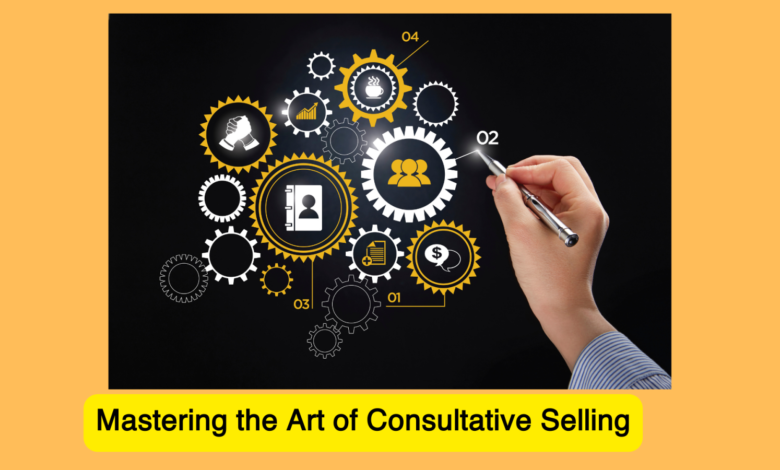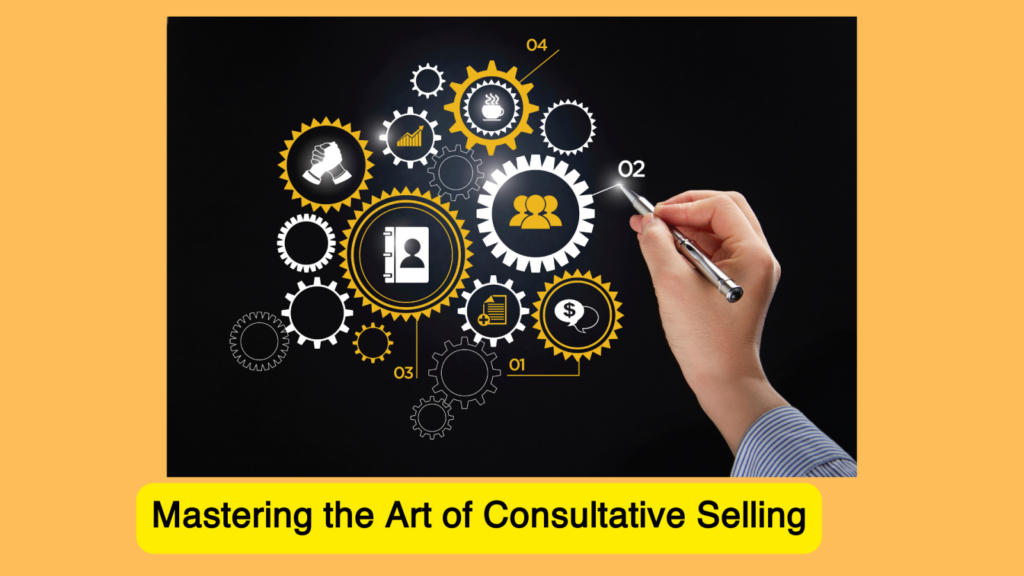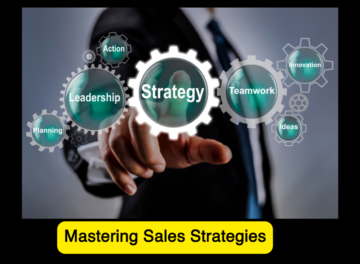Mastering the Art of Consultative Selling: Techniques and Best Practices

Consultative selling has become a prominent approach in today’s sales environment, emphasizing the importance of understanding and addressing the specific needs and challenges of customers. Unlike traditional sales methods that focus primarily on pitching products or services, consultative selling prioritizes building relationships and providing tailored solutions. This article explores the principles of consultative selling, offers practical techniques, and shares best practices for mastering this approach to achieve sales success.

Understanding Consultative Selling
Consultative selling is a customer-centric approach that involves acting as a trusted advisor rather than just a salesperson. The primary goal is to understand the customer’s unique needs, challenges, and goals, and then offer solutions that address those needs effectively.
This approach contrasts with traditional sales tactics, which often involve a more transactional mindset. Instead of pushing products or services, consultative selling focuses on engaging in meaningful conversations with customers, identifying their pain points, and recommending solutions that provide real value.
Key Principles of Consultative Selling
- Active Listening: Effective consultative selling begins with active listening. Sales representatives must fully understand the customer’s needs and concerns before offering solutions. Active listening involves not only hearing the words but also interpreting the underlying meaning and emotions.
- Questioning Techniques: Asking the right questions is crucial in consultative selling. Open-ended questions encourage customers to share more about their challenges and objectives, while probing questions help uncover deeper insights. Questions should be designed to explore the customer’s current situation, pain points, and desired outcomes.
- Empathy and Rapport: Building rapport and demonstrating empathy are essential for establishing trust with customers. Sales representatives should show genuine interest in the customer’s situation, acknowledge their feelings, and communicate understanding. Empathy helps create a positive relationship and fosters open communication.
- Tailored Solutions: Consultative selling requires offering solutions that are specifically tailored to the customer’s needs. Instead of presenting a generic product or service, sales representatives should customize their recommendations based on the insights gathered during the conversation.
- Value Proposition: A strong value proposition is central to consultative selling. Sales representatives should clearly articulate the benefits and value of the proposed solution, highlighting how it addresses the customer’s unique challenges and goals.
Techniques for Effective Consultative Selling
- Conducting Needs Assessments: A thorough needs assessment is the foundation of consultative selling. Sales representatives should engage in detailed discussions with customers to identify their current situation, pain points, and desired outcomes. This assessment helps in crafting a solution that aligns with the customer’s needs.
- Providing Solutions and Recommendations: Once the customer’s needs are understood, sales representatives should present solutions that address those needs. Recommendations should be well-supported with data, case studies, or examples that demonstrate the effectiveness of the proposed solution.
- Building Long-Term Relationships: Consultative selling focuses on building long-term relationships rather than just closing a single sale. Sales representatives should continue to engage with customers even after the initial sale, providing ongoing support and seeking opportunities for further collaboration.
- Handling Objections: Objections are a natural part of the sales process. In consultative selling, handling objections involves addressing the customer’s concerns with empathy and providing additional information or alternative solutions. Effective objection handling helps build trust and move the sales process forward.
- Follow-Up and Follow-Through: Follow-up is crucial in consultative selling. Sales representatives should maintain regular contact with customers to ensure their needs are met and address any additional questions or concerns. Follow-through demonstrates commitment and reinforces the relationship.
Best Practices for Implementing Consultative Selling
- Invest in Training and Development: Sales teams should receive training on consultative selling techniques and best practices. Ongoing development helps sales representatives enhance their skills and stay updated on industry trends and customer expectations.
- Utilize CRM Systems: Customer Relationship Management (CRM) systems are valuable tools for consultative selling. CRM systems help track customer interactions, manage information, and analyze data to gain insights into customer needs and preferences.
- Encourage Collaboration: Consultative selling often involves collaboration with other departments, such as marketing and product development. Encouraging cross-functional collaboration helps ensure that the solutions offered align with the customer’s needs and company capabilities.
- Measure and Analyze Performance: Regularly measuring and analyzing sales performance helps identify areas for improvement and assess the effectiveness of consultative selling strategies. Key performance indicators (KPIs), such as customer satisfaction, sales cycle length, and conversion rates, provide valuable insights.
- Foster a Customer-Centric Culture: A customer-centric culture supports consultative selling by prioritizing the customer’s needs and interests. Sales leaders should promote a culture of empathy, collaboration
Foster a Customer-Centric Culture (Continued)
- Foster a Customer-Centric Culture: A customer-centric culture supports consultative selling by prioritizing the customer’s needs and interests. Sales leaders should promote a culture of empathy, collaboration, and continuous improvement. Encouraging team members to put the customer’s needs first and invest in building meaningful relationships will enhance the effectiveness of consultative selling practices.
- Leverage Technology and Tools: Utilizing technology and tools can significantly enhance consultative selling. Beyond CRM systems, sales professionals can use analytics platforms, marketing automation tools, and customer feedback systems to gain deeper insights and improve their approach. These tools can help in tracking customer interactions, personalizing communications, and measuring the success of consultative strategies.
Case Studies: Success Stories in Consultative Selling
To illustrate the effectiveness of consultative selling, consider the following case studies:
- Case Study 1: Technology Solutions Provider
A technology solutions provider implemented consultative selling techniques to address the unique needs of their enterprise clients. By conducting comprehensive needs assessments and tailoring their solutions, the provider was able to build strong relationships and significantly increase their client retention rates. Their focus on understanding client challenges and offering personalized solutions resulted in a 30% increase in annual revenue and a substantial improvement in customer satisfaction scores. - Case Study 2: Financial Services Firm
A financial services firm adopted consultative selling practices to enhance their client advisory services. By prioritizing active listening and empathy, the firm’s advisors were able to offer more relevant financial solutions and build deeper client relationships. This approach led to a 25% increase in cross-sell opportunities and a notable boost in client referrals. The firm also experienced a higher rate of client engagement and satisfaction. - Case Study 3: B2B Manufacturing Company
A B2B manufacturing company embraced consultative selling to better understand the needs of their industrial clients. By conducting in-depth consultations and offering customized product solutions, the company was able to differentiate itself from competitors. The result was a 40% increase in repeat business and a significant enhancement in client loyalty. The company also gained valuable insights into market trends and customer preferences, which informed their product development strategy.
Challenges and Solutions in Consultative Selling
While consultative selling offers many benefits, it is not without its challenges. Here are some common challenges and strategies to overcome them:
- Challenge: Complex Sales Cycles
Consultative selling can involve long and complex sales cycles, particularly for high-value or enterprise deals. Solution: Implement a structured approach to managing the sales cycle, including clear milestones, regular check-ins, and detailed documentation. Use CRM systems to track progress and maintain communication with prospects throughout the process. - Challenge: Resistance to Change
Some sales professionals may be resistant to adopting consultative selling techniques, especially if they are accustomed to traditional methods. Solution: Provide comprehensive training and support to help sales teams understand the benefits of consultative selling. Share success stories and offer coaching to build confidence in the new approach. - Challenge: Maintaining Consistency
Ensuring consistency in consultative selling practices across a sales team can be challenging. Solution: Develop standardized processes and best practices for consultative selling. Regularly review and reinforce these practices through training sessions, role-playing exercises, and performance evaluations. - Challenge: Balancing Sales and Customer Needs
Sales representatives may struggle to balance their sales targets with the need to address customer needs thoroughly. Solution: Set realistic sales goals that align with consultative selling objectives. Encourage a focus on long-term relationships and value creation rather than just meeting short-term sales quotas.
Future Trends in Consultative Selling
As the sales landscape continues to evolve, several trends are likely to impact consultative selling practices:
- Increased Use of AI and Automation: Artificial intelligence (AI) and automation will play a growing role in consultative selling. AI-driven tools can analyze customer data, predict needs, and provide insights to sales representatives. Automation will streamline administrative tasks and allow sales professionals to focus on high-value interactions.
- Greater Emphasis on Personalization: Personalization will become even more critical as customers expect tailored experiences. Sales representatives will need to leverage data and insights to offer highly customized solutions and build deeper connections with clients.
- Integration of Omnichannel Strategies: Omnichannel strategies will be essential for consultative selling, as customers interact with businesses across multiple channels. Sales teams will need to provide a seamless experience across various touchpoints, including online, in-person, and mobile interactions.
- Focus on Customer Success: The concept of customer success will gain prominence in consultative selling. Sales representatives will need to focus on ensuring that customers achieve their desired outcomes and derive maximum value from their solutions. This shift will involve ongoing support, regular check-ins, and proactive engagement.
Conclusion
Consultative selling represents a transformative approach to sales that prioritizes understanding and addressing customer needs. By focusing on active listening, tailored solutions, and relationship building, sales professionals can enhance their effectiveness and drive long-term success. Implementing consultative selling techniques requires investment in training, technology, and a customer-centric culture. As sales practices continue to evolve, staying informed about emerging trends and adapting strategies will be key to maintaining a competitive edge in the market.



Real Estate I very delighted to find this internet site on bing, just what I was searching for as well saved to fav